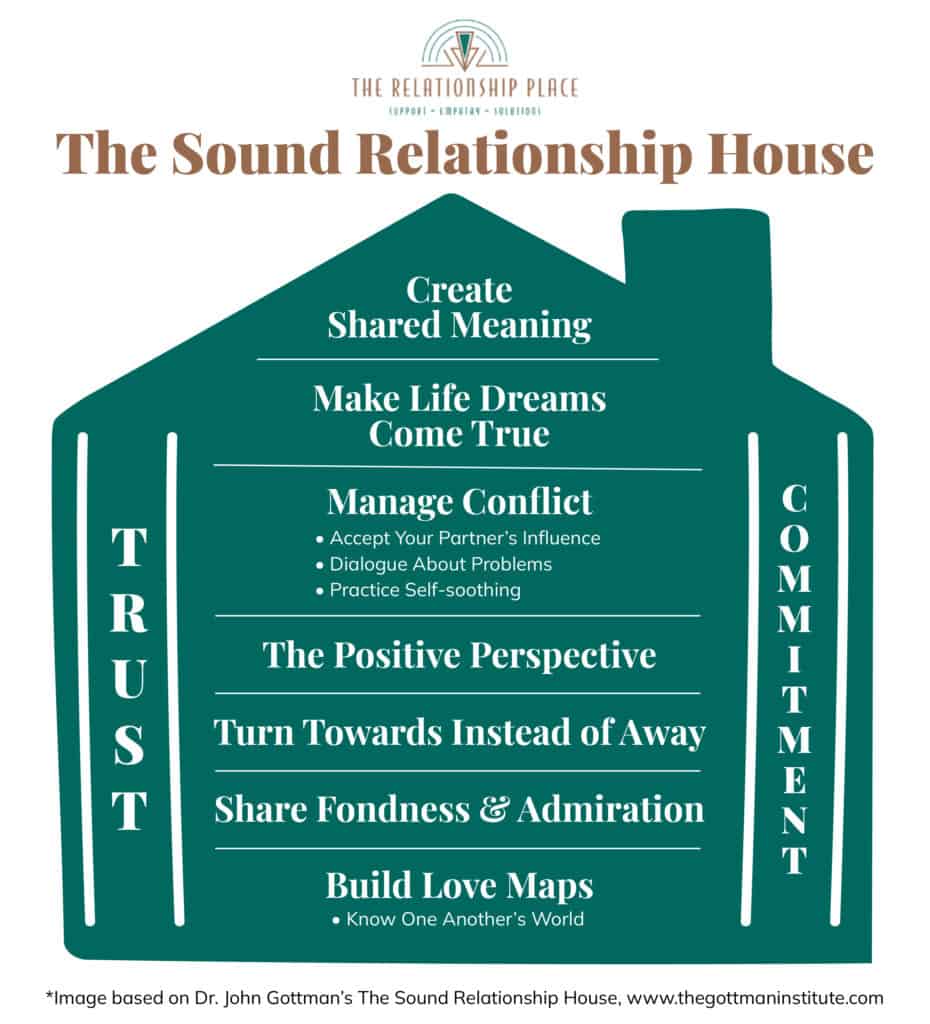The Sound Relationship House is a foundational theory introduced and developed by Dr. John Gottman. It says that a foundationally strong relationship is like a house. It contains weight-bearing pillars and floors that help couples establish a strong link. This structure, called the Sound Relationship House, has provided numerous couples with the foundations they need to have happy, healthy relationships that last.
Gottman Sound Relationship House assists couples in managing their marriages and developing problem-solving abilities. These abilities allow couples to be more adaptable in their relationships while also assisting them in achieving emotional stability and peaceful life.
How Effective Is The Sound Relationship House Theory?
The Sound Relationship House theory was developed through decades of study. Gottman conducted hundreds of empirical research with over 3,000 couples throughout his 40-year career. Gottman, together with his colleague, Robert Levenson discovered that the way couples interact determines whether marriages end in divorce or success.
Although every couple has different disagreements and poor encounters, Gottman discovered that how couples deal with conflict and the emotions they exhibit would eventually influence the success and longevity of their marriage.
Dr. Gottman’s research led to his collaboration with his wife, Julie Gottman, which developed the Sound Relationship House theory and the Gottman Method interventions.
The Sound Relationship House is built on seven levels and two pillars. The two pillars that keep the house standing are Trust and Commitment. Dr. John Gottman shares the seven principles linked to each level or floor of the Sound Relationship House in his book “The Seven Principles for Making Marriage Work.” These seven floors or levels are:
- Build Love Maps
- Share Fondness and Admiration
- Turn Towards Instead of Away
- The Positive Perspective
- Manage Conflict
- Make Life Dreams Come True
- Create Shared Meaning
Ways To Apply The Sound Relationship House Theory In Your Marriage
To apply this theory in your daily marriage, it’s beneficial to dig deeper into each of its principles. Let’s start with the two walls of the Sound Relationship House: Trust and Commitment.
Trust is when you feel your spouse has your best interests at heart and acts in ways that benefit you. Trust is accepting that your partner cares about your wants and needs just as much as they care about their own. Simply it is the conviction that “my spouse has my back and is always there for me.”
In your relationship, it is important to establish your trust using these five methods:
- Make your relationship’s trustworthiness a top concern.
- Make an effort to improve your partner’s well-being.
- Recognize that trust is established over time and in minor, positive events.
- Unfavorable comparisons should be avoided.
- Create a pattern of thoughts and actions that emphasize your partner’s excellent qualities while minimizing your focus on their flaws.
Commitment, on the other hand, is accepting (and acting on) that their relationship is a lifelong journey, and sticking together for better and worse. If couples are committed, they are focused on working on their relationship rather than magnifying mistakes or negative qualities of each other. It also helps them to avoid nurturing resentment by making unfavorable comparisons. The commitment wall entails:
- Cherishing one’s partner’s positive qualities,
- Cultivating an attitude of gratitude about what one has with this person,
- And comparing him or her favorably with real or imagined others.
Now the seven floors of the Sound Relationship House are where it becomes more specific. Here are ways you can apply the meaning of these floors to your relationship.

1. Get To Know Each Other’s Inner World (Build Love Maps)
Being a couple, you should be able to give each other a roadmap of who you are: what makes you happy, angry, sad, anxious, and everything in between. This constitutes the first floor of the Sound Relationship House: couples should get to know each other’s inner psychological worlds.
Keep an eye on your partner’s surroundings. These include their anxieties, tensions, joys, and dreams. In building love maps, every twist and turn is a chance to know your partner more. It’s more than just asking questions, it’s keeping yourself intrigued by his or her changing moods, emotions, and preferences constantly. It’s familiarizing yourself with each other, and creating directions towards the achievement of your goals.
2. Be Your Partner’s Cheerleader (Share Fondness and Admiration)
Relationships mostly begin easily. It starts with attraction, intimacy, which develops into romance and a happy-ever-after kind of marriage. However, once couples get married and this romantic phase expires, they’ll find themselves faced with the reality of having to work on their relationship.
This floor builds the foundation that keeps couples feeling appreciated for what they truly are. They should learn how to show their admiration and respect for one another, not just as partner and wife, but also as individuals. Rather than looking at your partner’s flaws in your marriage, focus on what they’re doing right and compliment them for it. This fosters a culture of gratitude, warmth, affection, and respect.
3. Accept Your Partner’s Emotional Offers (Turn Towards Instead of Away)
This floor talks about recognizing your partner’s needs and being able to work on them. Whether your partner is looking for attention, affection, or comfort, the other one should act on it appropriately, and vice versa. In this stage, it’s important to learn to accept emotional connection offers and not let the other person down. Whether it’s in the form of intimacy, a late-night conversation, or a simple hug, this helps establish that you are your partner’s energy-giver and a big source of happiness.
Whenever you feel you’re in a stressful situation, it’s important to turn towards your partner, instead of away, and in return, your partner should be the person who accepts this proposal. In a relationship, even the tiniest everyday events are opportunities to turn toward one another. For example, if your partner had a bad day at work, it’s important to comfort them and listen, even if you had it worse. It’s vital to establish that you got each other’s back and to let them know they are their safe haven.
4. Let Your Partner Influence You (The Positive Perspective)
Partners should always perceive each other in a favorable light. This way, they can let each other influence one another for the better. This means that you have to see your partner as an important part of your daily life and that their opinions and preferences matter. It’s also an acceptance that even if you see things differently, his or her perspective is important for you to listen to and consider.
In order to see each other from a positive perspective, couples should see a partner’s errors as a result of circumstances, rather than their personal failures. This helps build the foundation of friendship in a marriage. When your friendship is solid, you’ll see each other as valuable team players who you can depend on.
5. Understand Your Partner While Dealing With Change (Manage Conflict)
Interpersonal disagreement is natural and includes functional beneficial components. It’s important to know how to manage conflicts first before you can resolve them. This floor encourages couples how to better love and understand their partners, deal with change, and renew our romance despite disagreements and misunderstandings.
Conflicts cannot be avoided in marriage. This is why couples should be able to find ways how to manage them. Here’s a three-step method you can do when dealing with conflicts in your marriage:
- Begin considering each other’s feelings. Observe how your partner reacts on a conflict.
- Communication is always important. Partners must talk to each other about their issues openly.
- If one becomes overwhelmed during a fight, they must learn how to maintain their composure.
6. Encourage Your Partner’s Life Goals (Make Life Dreams Come True)
Your partner must be able to know what your biggest dream in life is, and you should be able to share that with him or her without any fear of judgment. Knowing and acknowledging this early in your marriage is essential as it’s one of the things that keep a person feeling happy and complete as an individual. As a partner, you should be able to support and encourage your better half’s aspirations in life, may it be for the both of you, for your family, or for themselves.
Most times, individuals who marry early still long to fulfill their life’s dreams that were put aside because married life, motherhood, or fatherhood happened. However, it’s not too late to find strategies to help each other achieve their life goals. Create an environment that allows each individual to talk honestly about his or her dreams and aspirations in life. It’s important to work your way through and establish these dreams around your life together. Some couples may see their dreams differently on the surface, but once you look deeper, you’ll know these dreams may have similarities and a common goal.
7. Build Romantic Rituals Together (Create Shared Meaning)
The final and topmost floor inside Gottmans’ sound relationship house suggests creating shared meaning through rituals, stories, roles, and goals as couples. This will help you create a common purpose that you both share with each other in your relationship. This way, couples can be more giving, respectful, and patient with each other. The purpose of this level is to create shared meaning by discussing things like:
- Connection rituals (formal & informal)
- Goals that are shared
- Providing support for each other’s life roles
- Getting on the same page about basic symbols like house, money, sex, and time together/apart.
Suppose one of you is a sucker for romantic films, it’s important to create a ritual around it that you can share together. Like going on romantic movie dates every Friday. Having these things that you can share with just the two of you gives your relationship exclusivity and lets you be more comfortable doing things with each other. The same goes for sharing common goals, roles, and symbols.
The Sound Relationship House assists couples in managing their marriages and developing problem-solving abilities. All these floors and walls help couples know more about each other, build a stronger bond, and have a more profound and rewarding relationship.
Guided by Gottman’s theories and principles, our relationship experts are happy to help couples like you establish their relationship goals better and build a marriage that lasts. Read the Ultimate Gottman Method Guide to know more about how it works or make today the day by scheduling an appointment with us.

